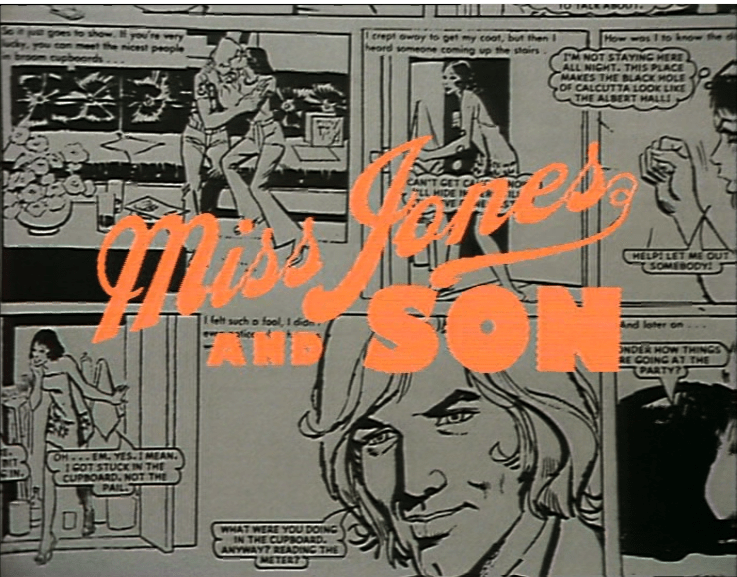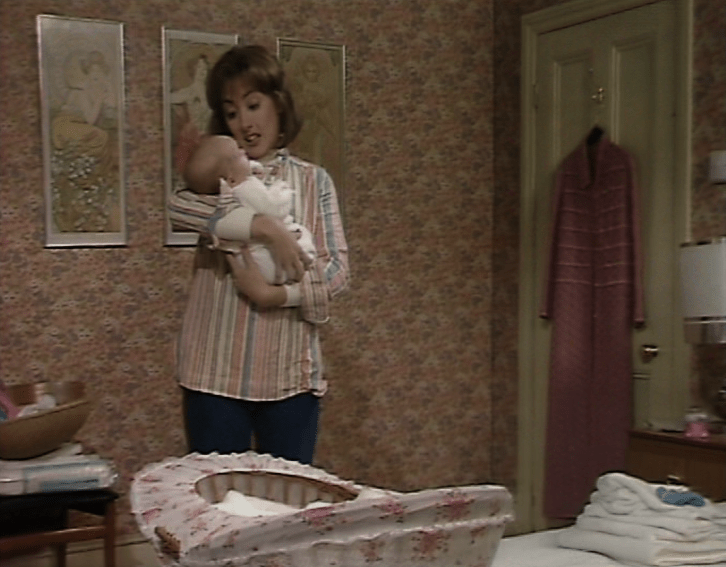
The past is an interesting time, a time that people would suggest housed funnier comedy and where you could get away with making jokes on minority groups without someone calling you out on it. I completely disagree with this view – even then, you had the likes of Mary Whitehouse and Points of View as indicators that people didn’t completely accept what was on their TVs – and further evidence for this comes in the fact that some groups were ignored altogether, usually because society was ashamed of them. Single mothers for one thing. This taboo was challenged by one sitcom in the 70s, a tale of a mother and her son surviving after the departure of the father in the family. I give you Miss Jones and Son.
History
At the time, Paula Wilcox was seeing success in Man About the House, where she played Chrissy Plummer. The producer of that, Peter Frazer-Jones, saw potential in her in the casting of Richard Waring’s (who had gained a talent for sitcoms focusing on domestic life such as Not in Front of the Children, featuring Wendy Craig as a scatterbrained housewife married to an art teacher, and My Wife Next Door, focusing on a divorced couple), newest comedy, focusing on the life of an unmarried mother. It should be noted at the time that unmarried mothers were quite a stigma in the UK, associated with shame and disadvantage – a sad amount of these mothers, upon discovery of their pregnancy, were sent away alone to special hostels, where they would have their babies and they would be adopted, to a couple who were considered more able to raise the children. It is a nasty situation, and it is this stigma that this sitcom tries to tackle.
The show lasted for two series, where it passed with little interest. Rumor does have it that Mary Whitehouse didn’t like it, but I’ve yet to find direct evidence of this, although her distaste in unmarried sexual union would have ensured that she wouldn’t have liked it anyway. However, the show was deemed successful enough to get a short-lived American remake, Miss Winslow & Son, which lasted for a single series in 1979.
Speaking in his book, Mark Lewisohn describes the show as “Never quite as adventurous as it could have been – there was no sign of any strike for independence or radical feminism in her thoughts or deeds”.
Plot
The story begins with a woman named Elizabeth (Paula Wilcox) about to give birth. The trouble of course is that the father, a reporter named Alan (Christopher Scouler), is AWOL, Elizabeth having lost her feelings for him – in fact, it’s not until the end of “Baptism Under Fire” that he even becomes aware that he has a son thanks to Roland Wellington (Derek Seaton) and he never reveals this knowledge as such to Elizabeth.

This of course means that she’s a single mother, to a child with the lengthy name of Roland Desmond Geoffrey Alan Jones, and she must face challenges such as a restricted social life, difficulties in getting work, and disapproving parents in Desmond (Norman Bird) and Mary (Charlotte Mitchell in Series 1, Joan Scott in Series 2), who make it clear that they’re disappointed in her for what she did and want her to find a man.

Also on hand is Geoffrey (Christopher Beeny), her neighbor, who could always be on hand to help with Elizabeth’s baby or pretend to be her husband. Naturally, there is some romantic undertones and “we’re not actually in a relationship” style misunderstandings between the two, and in Series 2, he admits that he did have feelings for her, but assumed that she would never be interested in him. Ironically, the fact that Elizabeth has a dinner set up in quite a romantic way in that scene suggests that she did have romantic feelings for him by this point, but by that point, it’s not meant to be, as Geoffrey finds love in a girl called Ruth who he had bullied in high-school and moves out to work with Ruth’s father, never to be seen again.

As for Elizabeth’s romantic prospects, Series 1 ends with her discovering soon-to-be divorced man Matthew (Richard Warwick), who like her is trying to hide his child, whilst looking at wallpaper for Roland and they seem to hit it off in a romantic sense, until Series 2 reveals that he reunited with his wife off-screen.

It’s not long until Elizabeth finds another love however in the form of David Lawrence (David Savile), a widowed writer with an 11-year-old daughter who moves in next door. The show ends with the suggestion that they will end up in a romantic relationship, although their scrabbles in the last episode and David’s speed to a nasty temper suggest that the relationship would not be completely harmonious.

Criticism
My major criticism of it is that it’s too breezy. Whilst Paula Wilcox does bring a sense of needed chirpiness to the series, rarely does her character Elizabeth convey much emotion beyond mild disappointment and the tone of the show is too farcical, mainly involving Elizabeth hiding her status from others and a ton of contrived coincidences.
There are moments where we do see an exploration of feminist issues. “Baby Talk” features Elizabeth showing off her portfolio to a boss named John, who seemed to be more interested in banging her than in her work before making unwanted sexual advances on her. Thankfully, Elizabeth manages to turn the situation by taking advantage of the strangeness that can come from the fact that she is an unmarried mother. Meanwhile, “And Father Came Too” has Roland winning the Bonny Baby Foods Contest, with Elizabeth and Geoffrey not finding out until afterward that it was limited to girls only. This inspires Elizabeth to make a passionate speech on his behalf about equal opportunities for all and the disadvantages of having a contest focused entirely on a single-sex.

However, this feminist side of the show is rarely explored, being more focused on giving Elizabeth a love interest and not nearly enough detail on her freelance work. I’m not looking for a grim exploration of mother-and-child homes, but more seriousness to the situation would have been nice.
The side characters also don’t really prop up the show that well. Geoffrey is mainly there to act as the supportive neighbour who has feelings for Elizabeth, whilst Desmond and Mary are there to be the disapproving parents. David is a bit more fleshed out, but he only shows up for the latter half of the series and one doesn’t get the impression that he would be a suitable partner for Elizabeth.
Favourite Episode
“And Father Came Too” – I really liked the budding relationship between Elizabeth and Matthew and I feel like they would have been a better couple than Elizabeth and David, mainly because Matthew doesn’t have the same angry temper that David has. Additionally, as mentioned earlier in this essay, Elizabeth’s speech about equal opportunities for all is, whilst distinctly 1970s in its way of Feminism, at least a rare opportunity for the show to show off an independent side.
Conclusion
As sitcoms go, this one probably sits in the middle. It’s not really offensive, outside of the audience laughing at a joke about the Lonely Hearts Club with a punchline that gay people use it, but it may be considered too tame in its subject matter and not packing enough bite. However, it is unremarkable either and there are better sitcoms out there which tackle the subject better. Still, you can find it on Youtube and on DVD.
